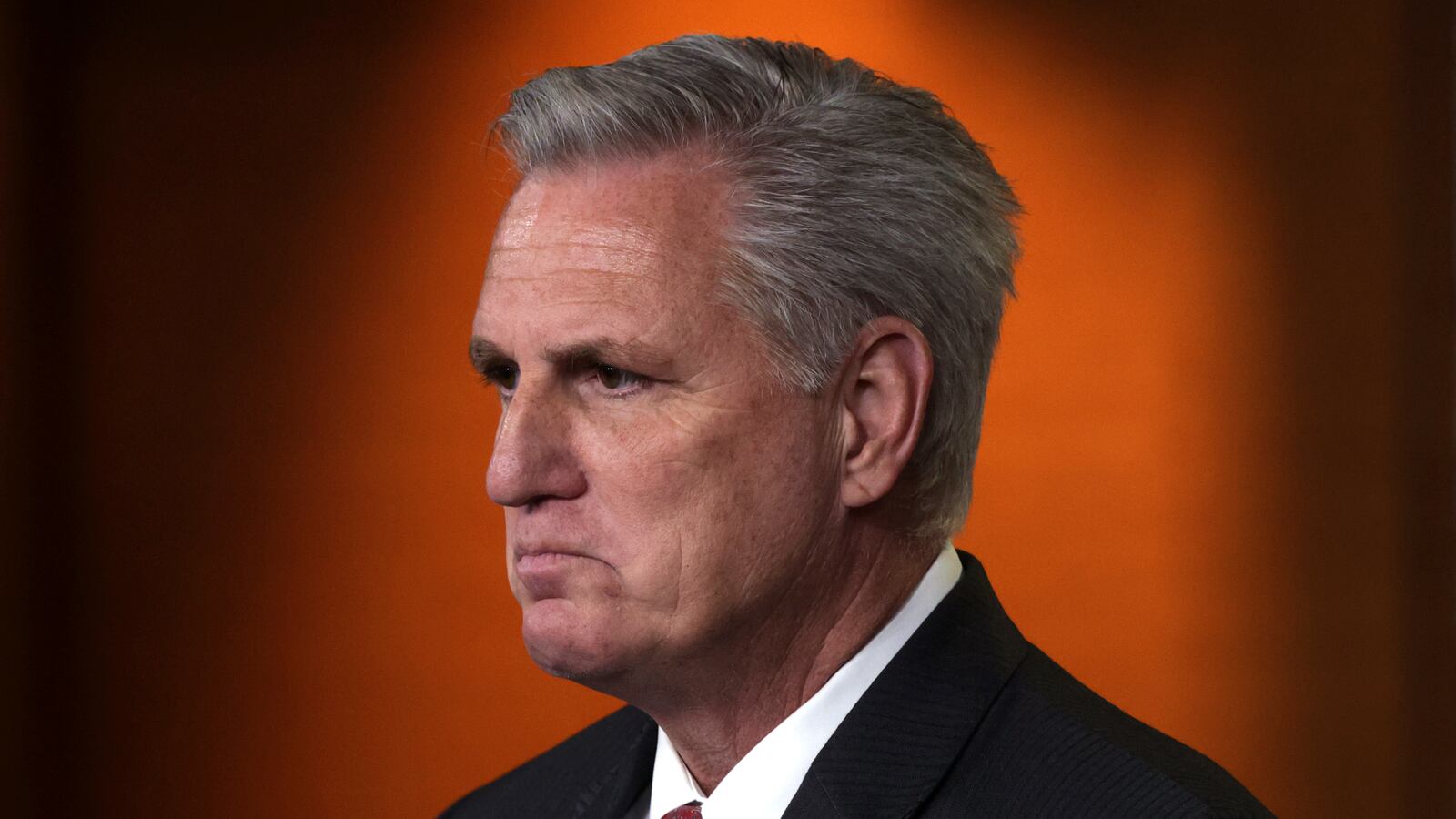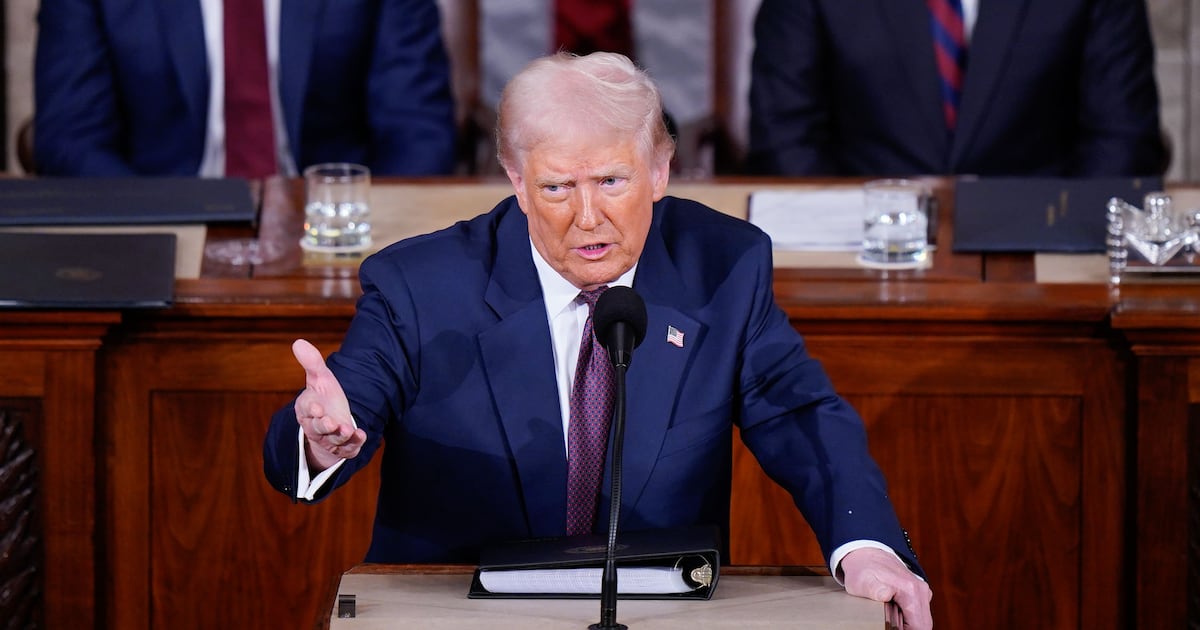Republicans still haven’t officially won the House majority, but that hasn’t stopped Rep. Kevin McCarthy (R-CA) from getting one step closer to ascending to the House’s most powerful post.
Winning his party’s nomination for Speaker through a closed-door vote on Tuesday was McCarthy’s first step—and his easiest. He defeated his lone challenger, Rep. Andy Biggs (R-AZ), a leading House conservative, by a reported tally of 188 to 31.
From here, however, the California Republican’s years-long quest for the Speaker’s gavel only gets harder.
When the new Congress meets in early January, McCarthy will need to muster 218 votes on the House floor. Because of the GOP’s poorer-than-expected midterm performance, he will have a majority so thin that his margin for error on that all-important vote will be minimal—roughly 10 times smaller than the number of votes he lost on Tuesday. And some members claimed there were five other votes against McCarthy but not for Biggs, which would fit with the total number of votes cast in other votes Tuesday, meaning 36 Republicans may have already opposed McCarthy.
Still, many insiders interpreted Tuesday’s secret-ballot tally as a clear sign that McCarthy’s bid for Speaker is full steam ahead. “It’s not like anything is surprising or alarming today,” said Rep. Brian Fitzpatrick (R-PA), a McCarthy supporter.
In another sign of strength, former critics of McCarthy came out to support him before and after the vote—most notably Rep. Marjorie Taylor Greene (R-GA), who the leader has conspicuously brought into the fold after a number of controversies made her a political pariah.
Once, Greene publicly toyed with sinking McCarthy’s ambitions. But after Tuesday’s vote, Greene appeared before reporters and declared “I don’t see why anyone would vote against” him.
That there were 30-some defections, likely most from the right-wing House Freedom Caucus, did not surprise insiders. Conservative lawmakers have never loved McCarthy, and they’ve denied him the speakership once before, in 2015. The GOP’s disappointing performance in the midterm elections only added a fresh dimension to their discontent.
“We have had two years to assess him as the leader,” said Rep. Bob Good (R-VA), “and I think today you're going to find that there's going to be a number of members who will not vote for him.”
After the vote, Rep. Matt Gaetz (R-FL), who has emerged as McCarthy’s most vocal critic, spun the tally as a clear sign that the leader lacks the support to be the party’s consensus pick. “I think we can do better… we need to turn the page,” said Gaetz, who called for a candidate with “broad credibility” with both conservative and moderate wings of the party.
But when Gaetz was pressed by reporters to name someone who could do better, his lack of an answer demonstrated McCarthy’s biggest strength: there isn’t a clear alternative—at least someone who is stepping forward right now.
In the famously fractious House GOP conference, leaders tend to be pulled apart by the often destructive push and pull between the party’s hardliners and everyone else. That fate befell the House GOP’s last two leaders—Paul Ryan and John Boehner—and it could derail McCarthy’s career before he even spends a day on the job.
But McCarthy remains the closest thing to a consensus leader the Republicans currently have, and that reality is abundantly clear to his allies.
“He objectively oversaw our conference during the most tumultuous peacetime era in history in Congress,” said Rep. Kelly Armstrong (R-ND), who reportedly gave the first speech in support of McCarthy ahead of the closed-door vote. “Criticism is part of this game, but somebody tell me, who else do we have who has built the relationships that could’ve navigated the last four years? And he should get credit for that.”
Others had harsher words. “Anybody that challenges Kevin,” said Rep. Mike Rogers (R-AL), “is very ungrateful and selfish.”
Some of those who did not support McCarthy likely know very well that there is no viable alternative to replace him—and that a chaotic speaker vote on Jan. 3 could only weaken them. Already, Republicans like Rep. Don Bacon (R-NE) have floated working with Democrats to find a compromise replacement Speaker if McCarthy doesn’t get the votes.
Instead, House conservatives are likely maneuvering to make the process painful for McCarthy in order to secure some long-desired changes to House rules that could shift power away from leadership and back to individual members. If they get them, many of those who voted against McCarthy on Tuesday could well support him when he needs their votes most.
Asked whether conservatives genuinely wanted new leadership or simply new rules, Freedom Caucus member Chip Roy (R-TX) demurred. “This is about getting to a very clear policy agenda, a strategy to execute it, and the rules to empower the conference to ensure that it occurs,” Roy told The Daily Beast. “Right now, the tendency is status quo.”
Some of the proposed changes are legislative maneuvers, like making it easier for members to make amendments on bills or to reject legislation that doesn’t have the support of the majority of the Republican conference. Others are outright targets on leadership, like boosting the Republican conference’s ability to remove McCarthy as speaker altogether.
McCarthy on Tuesday rejected a suggestion that he's ignored the Freedom Caucus’ proposed rule changes so far, but he did promise some semblance of change.
“The House is going to change. No longer is all the power going to rest the way Nancy had. No more proxy voting. Bills will actually go through committee. They will be debated before they come to the floor and people actually have a say,” McCarthy said.
Good told reporters Tuesday that members who are receptive to the proposed rule changes should make themselves known as McCarthy defectors looking for a home over these next few weeks. “But also we want to know what their vision is to stand strong against the Biden-Pelosi agenda,” he added.
McCarthy will have roughly seven weeks to make that case to his critics and lock down their votes. Soon, he’ll learn how much wiggle room he will get as the last outstanding House races are called. The likeliest scenario is that he ends up with 221 seats, meaning he can afford to lose three during the floor vote on January 3. Already, Gaetz has confirmed he will not vote for McCarthy under any circumstance.
Asked whether he’s concerned about members like Gaetz blowing up McCarthy’s bid, Rep. Byron Donalds (R-FL) didn’t fret. He even seemed to find some comfort in the example of Speaker Nancy Pelosi, their hated rival, who has survived internal challenges year after year to remain atop her party.
“At the end of the day,” Donalds said, “a lot of stuff always gets negotiated around here… some of the same stuff was probably going on, if I remember correctly, when I was coming in as a freshman with Nancy on the other side of the aisle, and they figured that thing out over there.”
“I think we're gonna do the same here,’ he said.










